NEW CANAAN, Conn. — After sitting empty for more than 60 years, the “extra” mansion owned by the reclusive heiress Huguette Clark — a French-style chateau sitting on 52 wooded acres — has at last found a buyer. The new owners are fashion designer Reed Krakoff and his wife, who scooped up the home for the drastically reduced price of $14.3 million.
The heiress to a copper fortune bought the home with 14,266 square feet of floor space in 1951 as a refuge during the Cold War. But she never moved in any furniture into the unoccupied house. It became the subject of local lore in affluent New Canaan, where some townspeople said the owner had not moved in after her new husband died at sea on the honeymoon. That wasn't true. The long-divorced heiress told her friends and employees that she intended it as a place that they all could go if New York City were threatened by nuclear attack.
Huguette (pronounced "oo-GET") Marcelle Clark was the youngest child of U.S. Sen. William Andrews Clark (1839-1925), one of the copper kings of Montana, a railroad builder, founder of Las Vegas, and one of the richest men of the Gilded Age. Huguette, born in Paris in 1906, died in 2011 at age 104, just two weeks short of her 105th birthday. The shy painter and doll collector had lived the last 20 years of her life in a series of simple hospital rooms in New York while her homes in Connecticut, California and New York were unoccupied.
Her Connecticut home originally hit the market in 2006. She agreed to sell the house to raise cash for the millions in gifts she was giving to her nurse, friends and strangers. The property was first listed at a price of $34 million. She rejected an offer for $25 million, because the appraisal had been a bit higher at $26 million. An accepted offer at $21 million fell through when the market crashed in 2008.
That's when the house led to a discovery of Clark's reclusive life. This reporter noticed the house atop the real estate listings, when it was priced at $25 million, and saw that town records showed the house as being vacant since the owner bought it. That led to a series of articles on NBC's website, reports on the Today show, and in media around the world. Huguette Clark became a trending topic on Yahoo and Google, and eventually the subject of a biography and a Hollywood film planned by director Ryan Murphy.
Follow NBC News Investigations on Twitter and Facebook.
Legal papers for the real estate sale were signed on Monday. The buyers are Reed and Delphine Krakoff. He is a fashion designer with his own label, and is known for having been the chief designer for Coach Inc., the handbag company. His wife is an interior decorator and, like Huguette Clark, was born in Paris. (Delphine Krakoff once worked for Christian Dior, from whom Clark bought clothes for her doll collection.) The couple recently sold a townhouse on Manhattan's Upper East Side for $51 million.
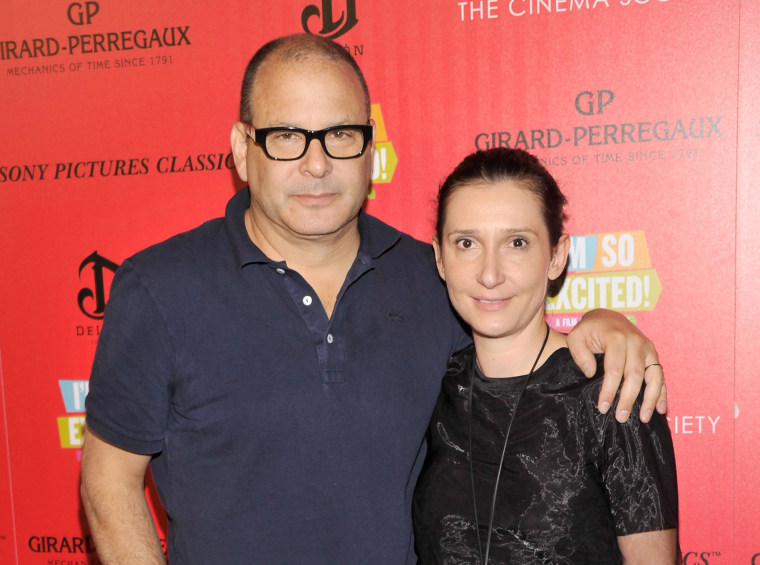
Although a subdivision was approved for the property at 104 Dan's Highway before Clark died, to make it easier to sell, the buyers say they will not sell off any of the 52 acres. Real estate broker Barbara Cleary declined to name the buyers, but Reed Krakoff told NBC News that he planned to live there quietly with his family. Attorneys familiar with the Clark estate confirmed the sale price of $14.3 million.
When the large black Mosler safe that fills a closet in the Connecticut house was drilled open recently, with lawyers gathered round, the safe contained nothing more than the architectural plans for the two-story addition when the painter expanded the house in 1952. On the stairway leading up from the enormous bedroom to an artist's loft, every other baluster is hand-carved in the shape of a paintbrush. But the artist who owned the house never spent a night here.
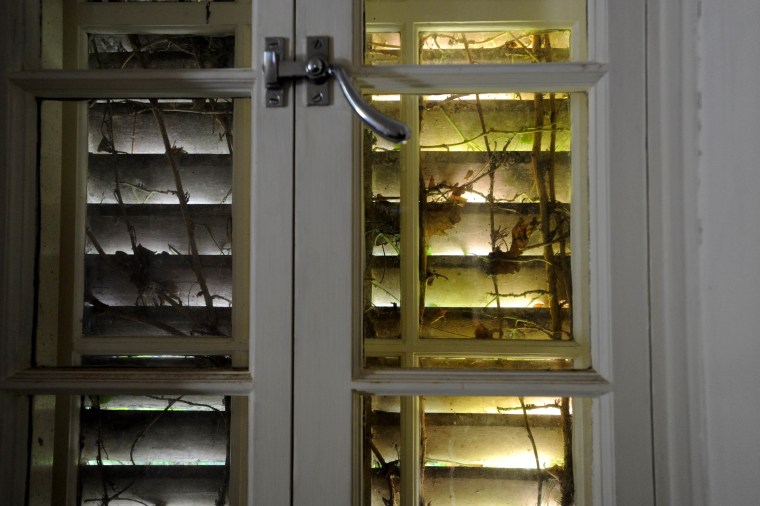
The New Canaan estate, known as Le Beau Chateau, is tucked into the woods, hidden even from the light traffic on Dan's Highway, actually a country lane. All one can see from the street are two tiny cottages for caretakers behind a crumbling brick wall and rusty gate. The house has 22 rooms, nine baths, 11 fireplaces, a wine cellar, and an elevator. When Huguette Clark owned it, the annual property taxes were $160,000.
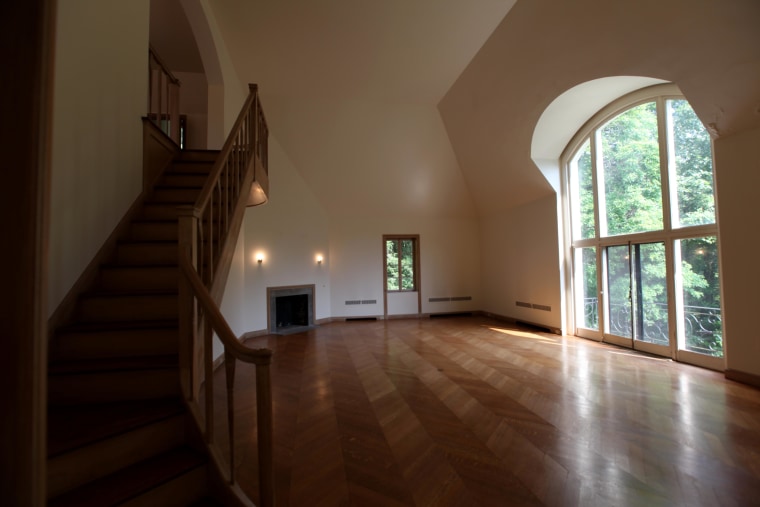
The price of Le Beau Chateau fell to $17 million after Clark died. One potential buyer had an offer accepted, but then the financing fell through. He was real estate developer Jack Worthington, who had made a splash in 2008 by claiming he was the son of John F. Kennedy. The house went back on the market.
Art sale at Christie's
The Clark estate has also set the dates for public showings and sales of many of her possessions, including a Monet water lilies painting estimated to be worth at least $25 million, three paintings by Renoir, and more than 400 other items, including furniture, musical instruments and rare books. The showings begin Friday at Christie's auction house at Rockefeller Center in New York, on West 49th Street near Sixth Avenue. (Read more about the art sales.)
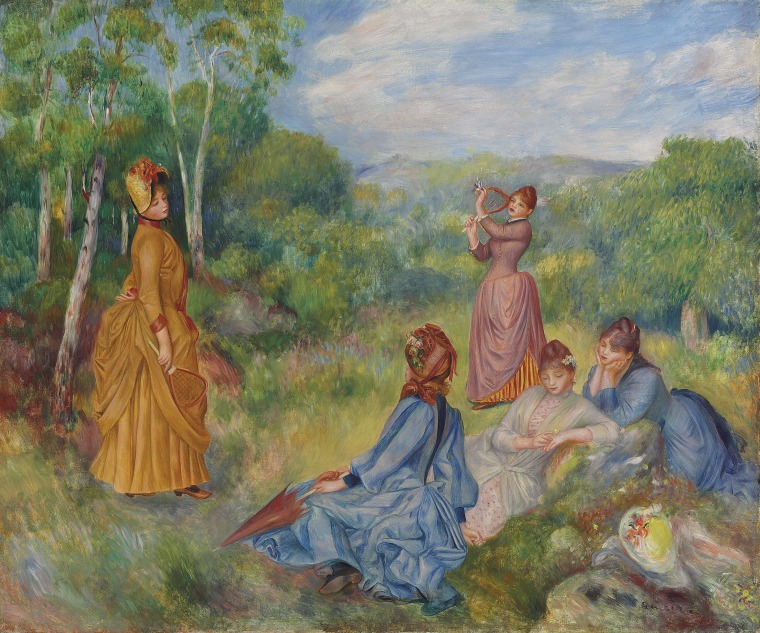
The items to be sold do not include Clark's $1.7 million doll collection, nor the paintings created that she created. Those will go to a new foundation for the arts, the Bellosguardo Foundation, named for her home in Santa Barbara, Calif., which will become the largest asset of the foundation.
Clark's three New York City apartments in the same building at 72nd Street and Fifth Avenue overlooking Central Park, sold for nearly the asking price, a total of $54.8 million for the 15,000 square feet total. The buyers were modern-day titans, hedge fund manager Boaz Weinstein, private-equity manager Frederick Iseman, and real estate investor David Luski. Even accounting for inflation, Clark's investment in the apartments had increased forty-seven fold.
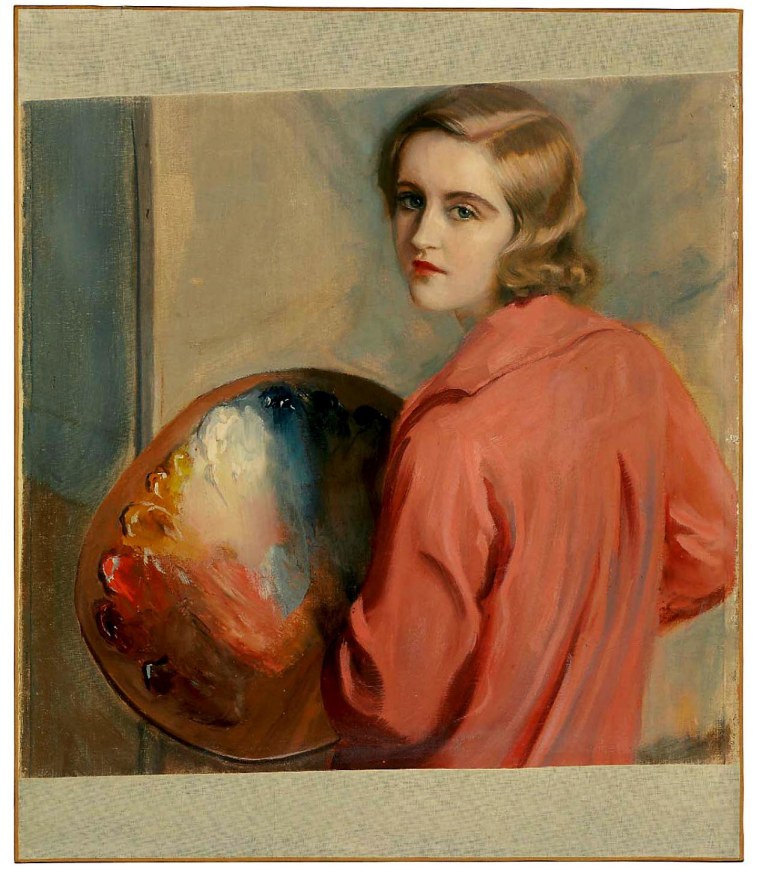
After Clark died in 2011 at age 104, nineteen relatives challenged her last will and testament, which had cut them out of her $300 million copper fortune. The relatives claimed that she was mentally ill and had been defrauded by her nurse, attorney and accountant. No one was charged with any crime after an investigation by the district attorney's office, but enough questions were raised that the case was settled in September 2013 just after jury selection began. The relatives, who last saw her in 1957 and most of whom never met Clark, will receive $34.5 million. Lawsuits continue as the relatives hope to receive more money from Clark's hospital and doctor.
The millions from the sale of the Connecticut property, and Clark's other property, will help fund the settlement agreed to last September.
Her California property, in Santa Barbara, is going to a new foundation for the arts, the Bellosguardo Foundation, the largest beneficiary of the Clark estate. It is expected to form a board of directors this summer.
———
See all the stories in the NBC series. NBC News reporter Bill Dedman is the co-author of the New York Times bestseller "Empty Mansions: The Mysterious Life of Huguette Clark and the Spending of a Great American Fortune." The co-author is Paul Clark Newell Jr., Huguette Clark's cousin, who was not involved in the legal contest for her estate.